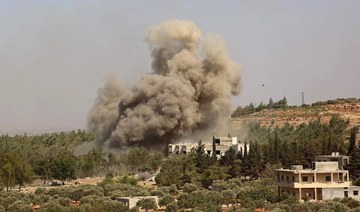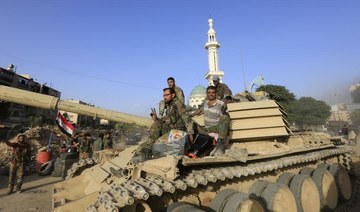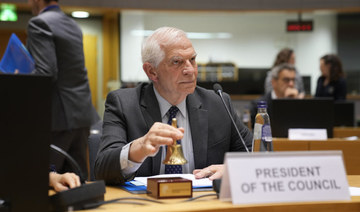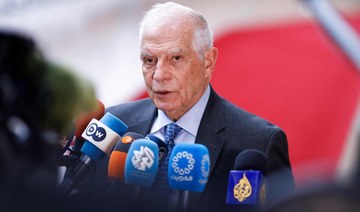AMMAN: Syrian rebels waged a spate of mortar attacks on Syrian army checkpoints in the southern province of Daraa, rebels, residents and the army said on Thursday.
This is the biggest flare-up of violence since government forces retook the restive region three years ago.
The widespread attacks at army outposts near the Damascus-Daraa highway leading to the border crossing of Nassib with Jordan also disrupted passenger and commercial traffic at the main gateway for goods from Lebanon and Syria to the Gulf.
Multiple army checkpoints around key towns and villages from the town of Nawa north of the province to Muzarib near the border with Jordan were also seized, they said.
The army has sent reinforcements from its elite Fourth Division, run by Syrian President Bashar Assad’s brother Maher, senior military defectors said, confirming army leaks.
The attacks came after the army launched a dawn operation against the rebel-held old quarter of the city of Daraa, where peaceful protests against decades of autocratic Assad family rule began in 2011 and were met by deadly force before spreading across the country.
The army has sought to reassert its control after the collapse of talks earlier this week to get local elders and former rebels to allow the army to extend its control inside the old quarter, known as Daraa al Balad.
The Syrian army, aided by Russian air power and Iranian militias, retook control of the strategic province that borders Jordan and Israel’s Golan Heights to the west in the summer of 2018.
Russian-brokered deals at the time forced rebels to hand over heavy weapons and return state institutions in the enclave but kept away the army from entering their neighborhoods.
“The rebels have waged a counter offensive after the army operation against Daraa whose intensity has taken the regime by surprise,” said Zaid al Rayes, a political opposition figure in touch with local groups in Daraa.
State media said terrorists had fired at the main hospital in Daraa and the army had evacuated hundreds of fleeing families from rebel held neighborhoods.
Thousands of former rebels had chosen to stay with their families rather than head to remaining rebel-held areas in northern Syria, where tens of thousands of others displaced from recaptured areas had gathered.
The province saw a widespread boycott of last May’s polls that extended Assad’s presidency in what officials saw as a defiance of state authority.
Western intelligence sources say growing dissent is aggravated by the presence of Iranian-backed local militias who now hold sway and act with impunity since the central government is too weak to impose its authority on the area.
Syrian rebels attack army outposts in southern Syria
https://arab.news/v9qx6
Syrian rebels attack army outposts in southern Syria
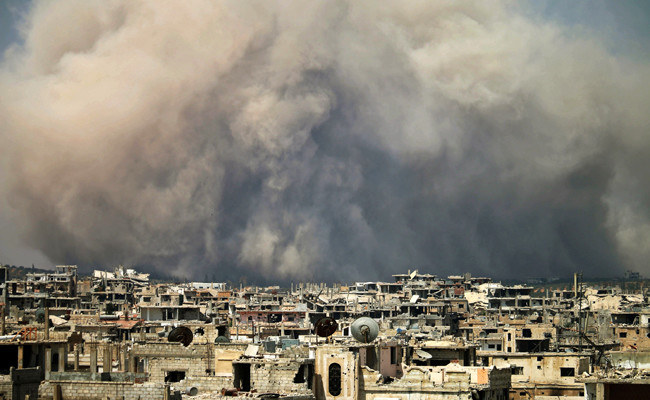
- This is the biggest flare-up of violence since government forces retook the restive region three years ago
- The widespread attacks at army outposts near the border crossing of Nassib with Jordan also disrupted passenger and commercial traffic
Palestinians rally at historic villages in northern Israel

- The descendants of the 160,000 Palestinians who managed to remain in what became Israel presently number about 1.4 million, around 20 percent of Israel’s population
- Israel has killed more than 35,000 Palestinians in Gaza, mostly women and children, according to the health ministry in the Hamas-run territory
SHEFA-AMR: Thousands of people took part Tuesday in an annual march through the ruins of villages that Palestinians were expelled from during the 1948 war that led to Israel’s creation.
Wrapped in keffiyeh scarves and waving Palestinian flags, men and women rallied through the abandoned villages of Al-Kassayer and Al-Husha — many holding signs with the names of dozens of other demolished villages their families were displaced from.
“Your Independence Day is our catastrophe,” reads the rallying slogan for the protest that took place as Israelis celebrated the 76th anniversary of the proclamation of the State of Israel.
The protest this year was taking place against the backdrop of the ongoing war in Gaza, where fighting between Israel and Palestinian militant group Hamas has displaced the majority of the population, according to the United Nations.
Among those marching Tuesday was 88-year-old Abdul Rahman Al-Sabah.
He described how members of the Haganah, a Zionist paramilitary group, forced his family out of Al-Kassayer, near the northern city of Haifa, when he was a child.
They “blew up our village, Al-Kassayer, and the village of Al-Husha so that we would not return to them, and they planted mines,” he said, his eyes glistening with tears.
The family was displaced to the nearby town of Shefa-Amr.
“But we continued (going back), my mother and I, and groups from the village, because it was harvest season, and we wanted to live and eat,” he said.
“We had nothing, and whoever was caught by the Israelis was imprisoned.”
Palestinians remember this as the “Nakba,” or catastrophe, when around 760,000 Palestinians fled or were driven from their homes during the war that led to the creation of Israel.
The descendants of the 160,000 Palestinians who managed to remain in what became Israel presently number about 1.4 million, around 20 percent of Israel’s population.
Many of today’s Arab Israelis remain deeply connected to their historic land.
At Tuesday’s march, one man carried a small sign with “Lubya,” the name of what was once a Palestinian village near Tiberias.
Like many other Palestinian villages, Al-Husha and Al-Kassayer witnessed fierce battles in mid-April 1948, according to historians of the Haganah, among the Jewish armed groups that formed the core of what became the Israeli military.
Today, the kibbutz communities of Osha, Ramat Yohanan and Kfar Hamakabi can be found on parts of land that once housed the two villages.
“During the attack on our village Al-Husha, my father took my mother, and they rode a horse to the city of Shefa-Amr,” said Musa Al-Saghir, 75, whose village had been largely made up of people who immigrated from Algeria in the 1880s.
“When they returned to see the house, the Haganah forces had blown up the village and its houses,” said the activist from a group advocating for the right of return for displaced Arabs.
Naila Awad, 50, from the village of Reineh near Nazareth, explained that the activists were demanding both the return of displaced people to their demolished villages within Israel, as well as the return of the millions of Palestinian refugees living in the West Bank, Gaza and other countries.
“No matter how much you try to break us and arrest us, we will remain on our lands,” she insisted.
Egypt rejects Israel’s denial of role in Gaza aid crisis

- Sameh Shoukry: “Egypt affirms its categorical rejection of the policy of distorting the facts and disavowing responsibility followed by the Israeli side”
CAIRO: Egypt’s foreign minister on Tuesday accused Israel of denying responsibility for the humanitarian crisis in Gaza after his Israeli counterpart said Egypt was not allowing aid into the war-torn territory.
Israeli troops on May 7 said they took control of the Palestinian side of the Rafah crossing to Egypt as part of efforts to root out Hamas militants in the east of Rafah city.
The move defied international opposition and shut one of the main humanitarian entry points into famine-threatened Gaza. Since then, Egypt has refused to coordinate with Israel aid access through the Rafah crossing.
Sameh Shoukry, Egypt’s foreign minister, said in a statement that “Egypt affirms its categorical rejection of the policy of distorting the facts and disavowing responsibility followed by the Israeli side.”
In a tweet on social media platform X, Israeli Foreign Minister Israel Katz had said, “Yesterday, I spoke with UK Foreign Secretary David Cameron and German Foreign Minister Annalena Baerbock about the need to persuade Egypt to reopen the Rafah crossing to allow the continued delivery of international humanitarian aid to Gaza.”
Katz added that “the key to preventing a humanitarian crisis in Gaza is now in the hands of our Egyptian friends.”
Shoukry, whose country has tried to mediate a truce in the Israel-Hamas war, responded that “Israel is solely responsible for the humanitarian catastrophe that the Palestinians are currently facing in the Gaza Strip.”
He added that Israeli control of the Palestinian side of the Rafah border crossing and its military operations exposes “aid workers and truck drivers to imminent dangers,” referencing trucks awaiting entry to Gaza.
This, he said, “is the main reason for the inability to bring aid through the crossing.”
UN chief Antonio Guterres said he is “appalled” by Israel’s military escalation in Rafah, a spokesman said.
Guterres’ spokesman Farhan Haq said “these developments are further impeding humanitarian access and worsening an already dire situation,” while also criticizing Hamas for “firing rockets indiscriminately.”
Since Israeli troops moved into eastern Rafah, the aid crossing point from Egypt remains closed and nearby Kerem Shalom crossing lacks “safe and logistically viable access,” a UN report said late on Monday.
Daesh claims attack on army post in northern Iraq

- Daesh said in a statement on Telegram it had targeted the barracks with machine guns and grenades
BAGHDAD: Daesh claimed responsibility on Tuesday for an attack on Monday targeting an army post in northern Iraq which security sources said had killed a commanding officer and four soldiers.
The attack took place between Diyala and Salahuddin provinces, a rural area that remains a hotbed of activity for militant cells years after Iraq declared final victory over the extremist group in 2017.
Security forces repelled the attack, the defense ministry said on Monday in a statement mourning the loss of a colonel and a number of others from the regiment. The security sources said five others had also been wounded.
Daesh said in a statement on Telegram it had targeted the barracks with machine guns and grenades.
Iraq has seen relative security stability in recent years after the chaos of the 2003-US-led invasion and years of bloody sectarian conflict that followed.
Israeli forces repeatedly target Gaza aid workers, says Human Rights Watch

- They are among more than 250 aid workers who have been killed in Gaza since the war erupted more than seven months ago, according to UN figures
- Israel has killed more than 35,000 Palestinians in Gaza, mostly women and children, according to the health ministry in the Hamas-run territory
JERUSALEM: Human Rights Watch said on Tuesday that Israel had repeatedly targeted known aid worker locations in Gaza, even after their coordinates were provided to Israeli authorities to ensure their protection.
The rights watchdog said that it had identified eight cases where aid convoys and premises were targeted, killing at least 15 people, including two children.
They are among more than 250 aid workers who have been killed in Gaza since the war erupted more than seven months ago, according to UN figures.
In all eight cases, the organizations had provided the coordinates to Israeli authorities, HRW said.
This reveals “fundamental flaws with the so-called deconfliction system, meant to protect aid workers and allow them to safely deliver life-saving humanitarian assistance in Gaza,” it said.
“On one hand, Israel is blocking access to critical lifesaving humanitarian provisions and on the other, attacking convoys that are delivering some of the small amount that they are allowing in,” Belkis Wille, HRW’s associate crisis, conflict and arms director, said in Tuesday’s statement.
HRW highlighted the case of the World Central Kitchen, a US-based charity who saw seven of its aid workers killed by an Israeli strike on their convoy on April 1.
This was not an isolated “mistake,” HRW said, pointing to the other seven cases it had identified where GPS coordinates of aid convoys and premises had been sent to Israeli authorities, only to see them attacked by Israeli forces “without any warning.”
EU top diplomat sees US ‘fatigue’ in Mideast

- Josep Borrell strongly criticized Israel’s war campaign, saying Gazans were ‘dying and starving and suffering in unimaginable proportions’ and that it was a ‘man-made disaster’
- Josep Borrell: ‘I see a certain fatigue from the US side to continue engaging in looking for a solution’
SAN FRANCISCO: The European Union’s top diplomat has said that the United States is showing “fatigue” in its Middle East diplomacy and called for greater EU efforts toward a Palestinian state.
On a visit to California, the bloc’s foreign policy chief Josep Borrell again strongly criticized Israel’s war campaign, saying Gazans were “dying and starving and suffering in unimaginable proportions” and that it was a “man-made disaster.”
“I see a certain fatigue from the US side to continue engaging in looking for a solution,” Borrell said in a speech Monday at Stanford University that was publicly released on Tuesday.
“We are trying to push with the Arab people in order to build together, the Arabs and Europeans, to make this two-state solution a reality,” he said in English.
US Secretary of State Antony Blinken has made seven trips to the Middle East since the unprecedented October 7 attack on Israel by Hamas which prompted a relentless Israeli military campaign in Hamas-ruled Gaza.
He has nudged Israel to allow in more aid, pushed against a regional escalation and pleaded for Israel to accept a two-state solution as part of a broader eventual deal that includes normalization with Saudi Arabia.
But the United States vetoed a Security Council bid to give Palestine full UN membership, arguing that statehood can only come though negotiations that address Israel’s security concerns.
The General Assembly last week passed a symbolic vote for Palestinian membership with the United States one of only nine countries to vote against.
The others opposed included two European Union members — the Czech Republic and Hungary. Among EU heavyweights, France voted in favor and Germany abstained.
Borrell acknowledged that the vote showed the European Union was “very much divided” over Gaza, unlike on the Ukraine war, and cited “historical reasons.”
“But it doesn’t mean that we don’t have to take a stronger part of responsibility because we have delegated (to) the US looking for a solution,” he said.
Borrell, a former Spanish foreign minister, in February sharply criticized the US arms flow for Israel, pointing to President Joe Biden’s own words that too many people were dying in Gaza.
Biden last week for the first time threatened to cut military aid to Israel, with one shipment of bombs already halted, if Israel defies US warnings and assaults the packed city of Rafah.



